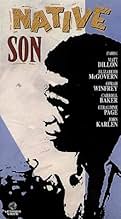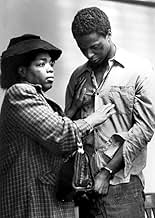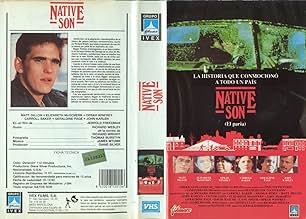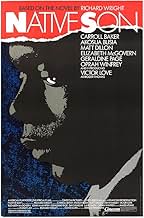IMDb-BEWERTUNG
6,0/10
649
IHRE BEWERTUNG
Füge eine Handlung in deiner Sprache hinzuIn 1940s Chicago, a young black man takes a job as a chauffeur to a white family, which takes a turn for the worse when he accidentally kills the teenage daughter of the couple and then trie... Alles lesenIn 1940s Chicago, a young black man takes a job as a chauffeur to a white family, which takes a turn for the worse when he accidentally kills the teenage daughter of the couple and then tries to cover it up.In 1940s Chicago, a young black man takes a job as a chauffeur to a white family, which takes a turn for the worse when he accidentally kills the teenage daughter of the couple and then tries to cover it up.
- Regie
- Drehbuch
- Hauptbesetzung
- Auszeichnungen
- 2 Nominierungen insgesamt
Empfohlene Bewertungen
This was a good film. It had some flaws, but was well worth a viewing. It takes on many issues which most current films gloss over or ignore entirely.
This is the second film of "Native Son," a Richard Wright book about a young black man who gets caught up in some tragic events in 1940's Chicago. Bigger Thomas, the young protagonist, goes to work for a wealthy white family after some prodding from his mother, played by Oprah Winfrey. He is drawn into the aforementioned events by the family's young and slightly wild daughter, played by Elizabeth McGovern.
There are several good scenes where the tension and a sense of claustrophobia is palpable. A scene near the end in a police station, in which all the main characters convene around Bigger, is effective but problematic. This scene is overwrought and unrealistic - there is no way all those people would be in the same room at once.
"Native Son" delves into the issues of racism, poverty and integration. It doesn't have easy answers for the audience, but rather leaves the questions out there for the viewer to ponder.
This is the second film of "Native Son," a Richard Wright book about a young black man who gets caught up in some tragic events in 1940's Chicago. Bigger Thomas, the young protagonist, goes to work for a wealthy white family after some prodding from his mother, played by Oprah Winfrey. He is drawn into the aforementioned events by the family's young and slightly wild daughter, played by Elizabeth McGovern.
There are several good scenes where the tension and a sense of claustrophobia is palpable. A scene near the end in a police station, in which all the main characters convene around Bigger, is effective but problematic. This scene is overwrought and unrealistic - there is no way all those people would be in the same room at once.
"Native Son" delves into the issues of racism, poverty and integration. It doesn't have easy answers for the audience, but rather leaves the questions out there for the viewer to ponder.
Synopsis: A young black man from the poor streets of Chicago, gets the opportunity of a lifetime working as a chauffer for a wealthy family. But in an effort not to jeopardize his first day on the job, something goes horribly wrong leaving him responsible for a murder.
The Review: Richard Wright's novel is an intense depiction of one man, trying to protect and better himself, whose own self is unwillfully brought into something he just gets into deeper. The book itself is five hundred pages and broken down into three separate novellas. One chunk of the book is exclusively devoted to a lawyer's speech about racism, that was completely excised from the film. The film, in a manner of speaking, is relatively different because it's compressed all the information. The film lacks the spark the book had as well as the impact. Not much sympathy can be said for any of the characters because their development just isn't strong enough. It's a distorted film that doesn't have any strengths to it, and the climax at the end, is really broken down to nothing more than just a series of edited scenes and voiceovers. If you love the novel, and want to see the film, just stick with the novel, because they simply aren't the same. Grade: C-
The Review: Richard Wright's novel is an intense depiction of one man, trying to protect and better himself, whose own self is unwillfully brought into something he just gets into deeper. The book itself is five hundred pages and broken down into three separate novellas. One chunk of the book is exclusively devoted to a lawyer's speech about racism, that was completely excised from the film. The film, in a manner of speaking, is relatively different because it's compressed all the information. The film lacks the spark the book had as well as the impact. Not much sympathy can be said for any of the characters because their development just isn't strong enough. It's a distorted film that doesn't have any strengths to it, and the climax at the end, is really broken down to nothing more than just a series of edited scenes and voiceovers. If you love the novel, and want to see the film, just stick with the novel, because they simply aren't the same. Grade: C-
I'm not sure what Diane Silver was thinking when she was making this movie, but it obviously had nothing to do with Richard Wright's novel, which the movie is based on.
We read the novel this past summer for AP English 12, and just watched the film. During periodic note-taking and checking of the clock, I contemplated the chances of being struck by lightning. Of course, the sky was completely clear, and I was forced to watch the rest of the movie... and then write a 5-paragraph essay on it.
Wright's novel discussed very real themes, of the mind of a killer and the psychology behind it. Silver's movie turned a murderer into a victim, which is NOT what Wright wanted (see: "How Bigger was Born" 454).
I'm going to make this short and sweet: if you want to leave your consciousness, in Raphael Lambert's words, unsullied, skip the movie and read the book. The 1986 adaptation is not thought-provoking material.
... ::sigh:: Now I have to write the essay.
We read the novel this past summer for AP English 12, and just watched the film. During periodic note-taking and checking of the clock, I contemplated the chances of being struck by lightning. Of course, the sky was completely clear, and I was forced to watch the rest of the movie... and then write a 5-paragraph essay on it.
Wright's novel discussed very real themes, of the mind of a killer and the psychology behind it. Silver's movie turned a murderer into a victim, which is NOT what Wright wanted (see: "How Bigger was Born" 454).
I'm going to make this short and sweet: if you want to leave your consciousness, in Raphael Lambert's words, unsullied, skip the movie and read the book. The 1986 adaptation is not thought-provoking material.
... ::sigh:: Now I have to write the essay.
Hey look, deal with it, there are much better portrayals of the hardship of black America than this. Although I think this story is weak, my criticism is focused on the poor execution of the story, which I have mentioned, blows.
This was made in the mid-80's and is horrible in the music/score department. It's funny to see Oprah as a latter-day crack-whore type.
The scene where Bigger stuffs Elizabeth McGovern into the incinerator. Pure classic cinema. First off, I don't care how drunk you are, you will react to 1200F degree flame (no matter how bad your acting). But they really milked that scene...it was comical. I'll tell you what though, I had great satisfaction in seeing Elizabeth McGovern burn in a faux death; she annoys me.
This was made in the mid-80's and is horrible in the music/score department. It's funny to see Oprah as a latter-day crack-whore type.
The scene where Bigger stuffs Elizabeth McGovern into the incinerator. Pure classic cinema. First off, I don't care how drunk you are, you will react to 1200F degree flame (no matter how bad your acting). But they really milked that scene...it was comical. I'll tell you what though, I had great satisfaction in seeing Elizabeth McGovern burn in a faux death; she annoys me.
Having been on set a few days I can say the acting overall was very good. A good early dramatic performance by Oprah. (Hint: She get's in a funky blue mood by singing spirituals offstage between takes) And a very impressive performance by Victor Love. Since everybody was working for scale all the names were to be listed and evenly credited.
Question: Who played Oprah's daughter? Diamond Dawn Cook (AKA: AdrienneCook) That's not in the IMDb database.
I was also impressed by the rat wrangler. Who knew so much effort went into that one scene. One rat to skitter across the floor. One to cower in the corner. And one killed, though not really with a frying pan.
Question: Who played Oprah's daughter? Diamond Dawn Cook (AKA: AdrienneCook) That's not in the IMDb database.
I was also impressed by the rat wrangler. Who knew so much effort went into that one scene. One rat to skitter across the floor. One to cower in the corner. And one killed, though not really with a frying pan.
Wusstest du schon
- WissenswertesOprah Winfrey, who plays Bigger Thomas's mother, is only 3 years older than Victor Love (the actor who plays Bigger Thomas) in real life.
Top-Auswahl
Melde dich zum Bewerten an und greife auf die Watchlist für personalisierte Empfehlungen zu.
- How long is Native Son?Powered by Alexa
Details
- Erscheinungsdatum
- Herkunftsland
- Sprache
- Auch bekannt als
- Native Son
- Drehorte
- Produktionsfirmen
- Weitere beteiligte Unternehmen bei IMDbPro anzeigen
Box Office
- Budget
- 2.000.000 $ (geschätzt)
- Bruttoertrag in den USA und Kanada
- 1.301.121 $
- Weltweiter Bruttoertrag
- 1.301.121 $
Zu dieser Seite beitragen
Bearbeitung vorschlagen oder fehlenden Inhalt hinzufügen

Oberste Lücke
By what name was Native Son - Im Namen der Gerechtigkeit (1986) officially released in Canada in English?
Antwort































